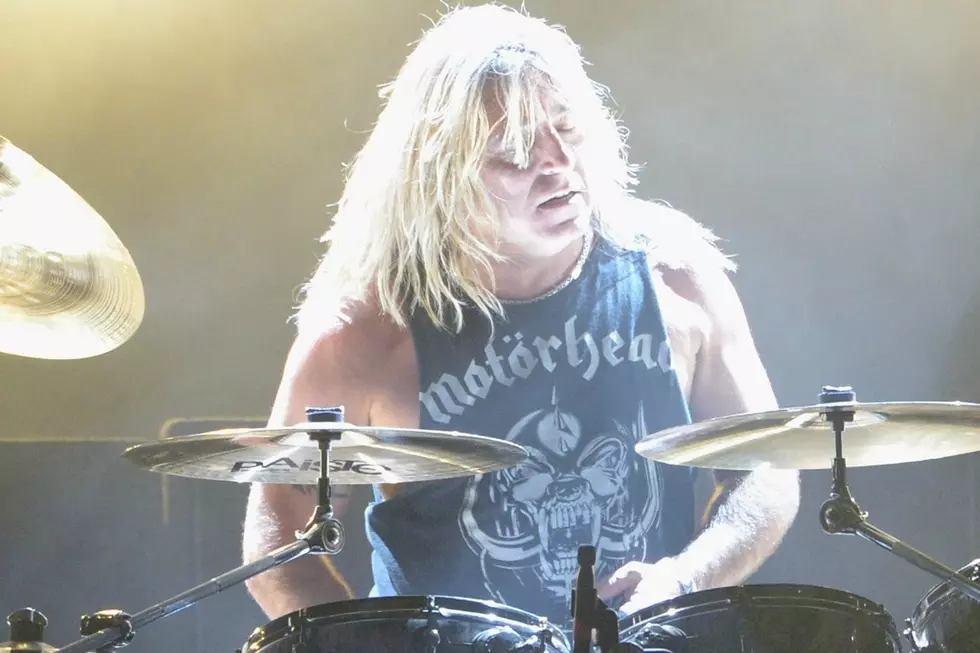
When Motorhead Kissed the Majors Goodbye on ‘Bastards’
Motorhead found themselves at a crossroads of sorts with the Nov. 29, 1993 release of Bastards. Having been in the game for nearly 20 years at that point, Lemmy Kilmister and band were dealing with a new drummer, a new record label and a new sense of urgency – all of which added up to one of the band's finest offerings.
The lineup had shifted significantly after longtime drummer Phil Taylor was ousted. Following the recording of the March or Die album, and after several warnings, Taylor was dismissed from Motorhead. The breaking point reportedly was due to his failure to learn the drum part for the song "I Ain’t No Nice Guy." In his autobiography, White Life Fever, Lemmy simply said Taylor needed to “get his act together."
He was soon replaced by Mikkey Dee from King Diamond.
At first, fans weren't sure what to make of the new drummer. “A lot of people didn’t know me, and they literally stood pointing at me going, ‘How can you bring this wanker into the band?’" Dee recalled in an interview with Loudersound. "I was the wrong guy completely. They hated me. But Lemmy stood up for me. He said, ‘Get out of my dressing room. Mikkey’s unbelievable – you wait and see!’"
The group assembled for the Bastards album included the short-lived quartet of Lemmy and Dee, and guitarists Phil Campbell and Wurzel, both of whom were members since 1986's Orgasmatron LP.
Listen to Motorhead's 'Bad Woman'
The band also switched record companies around this time. After two releases on Epic (1991's 1916 and the following year's March or Die), Lemmy had enough of the majors. "Hopeless – your average corner shop ... a small supermarket is run better than that," he commented in a 1993 interview. "Don't sign with major, pop kids. Get your own label!"
Motorhead joined up with the indie label ZYX for Bastards, which starts with the brutal one-two punch of "On Your Feet or on Your Knees" and "Burner." Whatever fatigue and lack of direction that plagued March or Die was quickly wiped away. The freshly minted quartet sound fierce and fresh throughout the album: "Death Or Glory," "We Bring the Shake" and "Bad Woman" rank among Motorhead's greatest songs.
There was even a haunting acoustic ballad about child molestation called "Don't Let Daddy Kiss Me" that stands out among Motorhead songs. "Child abuse is the worst crime in the world," Lemmy said at the time. "What has that child got left the rest of her life? Nothing." With just Lemmy and acoustic guitar, the track provides an emotional punch that's usually not associated with the band.
A lot of ground is covered on the 12-track LP. They move from 100-miles-per-hour assaults to straightforward rock 'n' roll. Fans and critics were equally supportive of the album, despite its patchy release at first. The small indie didn't have the majors' muscle to get the record mass distribution in 1993.
The late Lemmy singled out the record as one of his band's greatest. "One of the best albums we ever did," he recalled in White Line Fever.
Guitarist Phil Campbell, in a 2018 interview with UCR, agreed, calling Bastards his all-time favorite. "I don't know in terms of attention or being overlooked, you'd have to ask the fans," he said. "I don't know what the record sales were. I think they all sold pretty dismally. We were never up to Bon Jovi's standard. We were too pretty. But that one, it'll bring your ceiling down."
Top 50 Classic Heavy Metal Albums
Remembering Motorhead's Lemmy Kilmister
More From 99.1 The Whale










